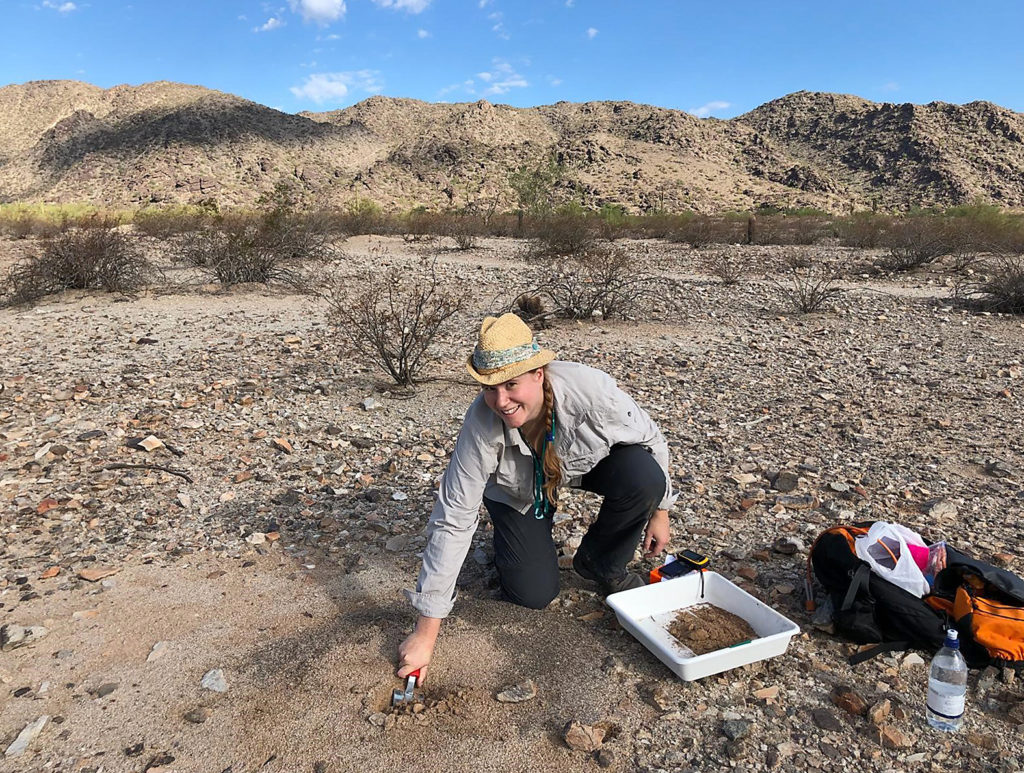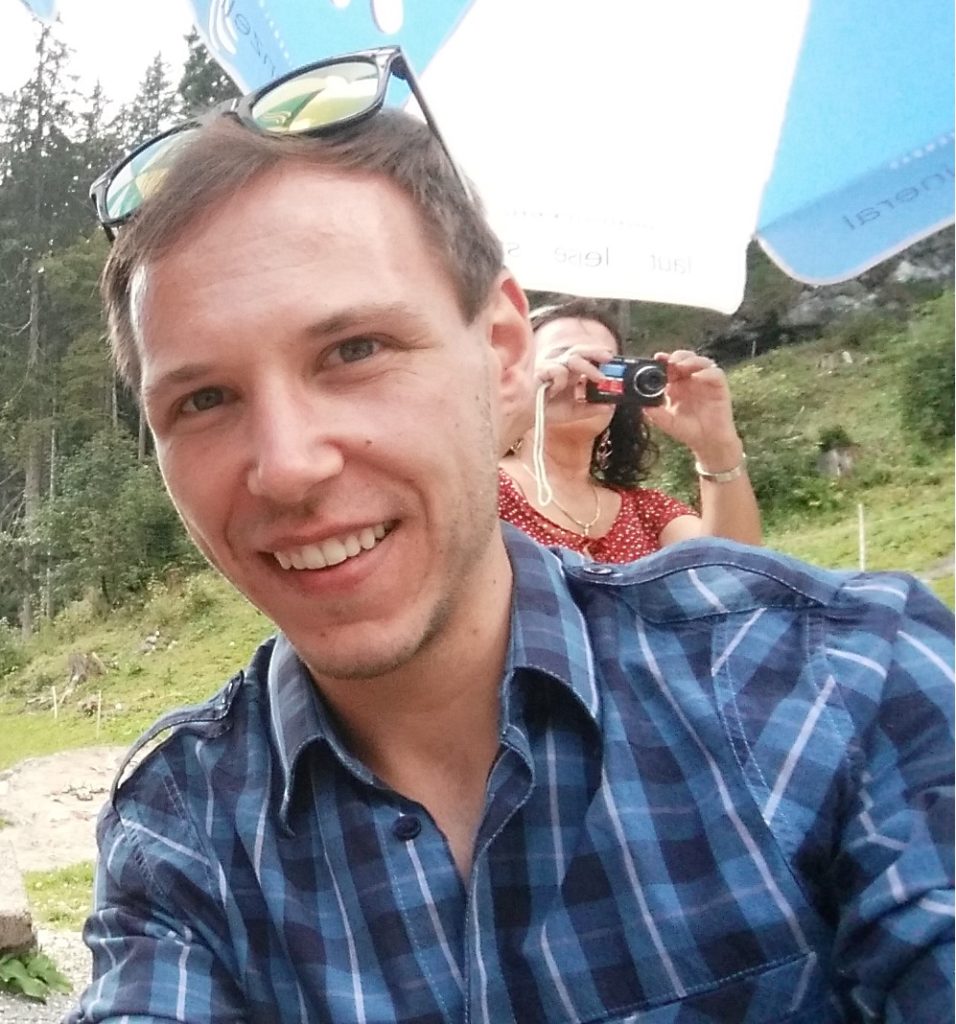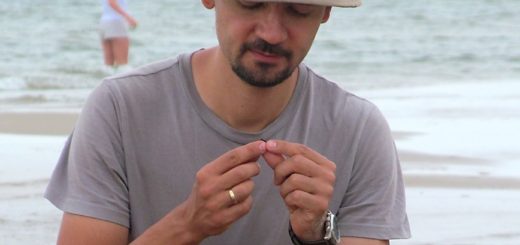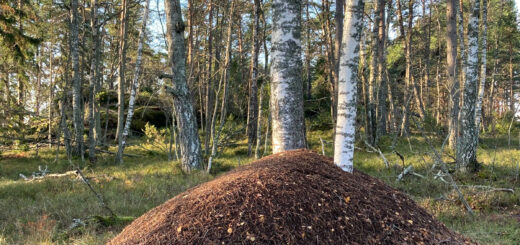Doing an ant PhD: Emeline Favreau

Emeline Favreau was born in the late eighties. She is originally from Nantes, in the northwest of France, but she moved to England when she was 20. She studied Environmental Sciences at Oxford Brookes University, during which she developed a passion for the wildlife in the Oxfordshire countryside. Next, she moved to London, where she volunteered at the Natural History Museum in the Coleoptera and Hymenoptera collection before she started a Master’s of Research in Biosystematics focusing on beetle phylogeny. She was by then hooked on evolutionary biology, so she started her
An Interview compiled by Patrick Krapf

MNB: What is the topic of your PhD thesis?
EF: The
evolutionary origin of social organisation,
focusing on ant species that are both monogynous and polygynous.
MNB: In which year of your PhD studies are you now?
EF: I am in my fourth and final year.
MNB: Why ants?
EF: Their social organisation, alongside all other social arthropods, is ever so unique and fascinating in the tree of life. I am also quite entertained by the diversity of their morphology!
MNB: How do you feel about field work?
EF: It is always a pleasure to go with specialists who are happy to share their knowledge. I enjoyed discovering new environments while sampling, be it Mediterranean, desertic, or tropical habitats; but not so much the formic acid lashed out by some angry Lasius workers.
MNB: … about identifying ants using a key?
EF: I have used keys to identify ants but this is not my speciality.
MNB: … working in the wet lab?
EF: I find working in the wet lab quite fun when I am creating a new protocol. It can be quite frustrating when it does not work, but in the end, I find myself relaxing when it works.
MNB: Have you been involved in any of the -omics approaches, and what was your experience?
EF: Yes. When I brought back the ants from the field, I extracted short and long molecule DNA. I then created more than 100 Illumina library preparations for a full-genome sequencing. I also got to play with Oxford Nanopore MinIon, a portable device that you plug in your laptop, pipette in your ant DNA preparation, and obtain long sequences within a day.
MNB: Did you acquire your statistics knowledge in university courses, from your supervisor, or on your own?
EF: I find that a mix of all mentioned above works best for me. The basic statistics tests that I use most of the time are coming from my university notes. Some more advanced are inspired from lab meetings, reading methods in articles, and many online forums.
MNB: What is the ideal frequency of meeting your supervisor for discussing your research from your point of view: daily, weekly, monthly?
EF: It really depends in which state my project is. If it is the beginning, we will discuss every day so that we both agree on the steps to take. If I am in the middle of a field trip, or processing many samples in the lab, we will meet less often. Flexibility and open-door policy are the best in my opinion.
MNB: If you have a great idea, how do you find out if it’s really great: sitting down and thinking, discussing with your supervisor, discussing with colleagues from the group, discussing with someone not into science?
EF: I first try to write it down in the style of a grant proposal, to see if the idea is well-grounded and to detail my thoughts. I will then mention it to my colleagues and supervisor to obtain some feedback.
MNB: How many papers do you read in an average week?
EF: This really depends on my current workload. If I am to process many samples, I dedicate the vast majority of the day hours to the wet lab and will not do much more. But when I am writing, it is easy to fall into the rabbit hole of reading one paper after the other. In our group, we review articles from various journals on a monthly basis (https://wurmlab.github.io/news/2018-02-20-Keeping_up_with_reading_newly_published_articles/). All in all, on average I probably read one article a day.
MNB: In an ideal world, is the working group you belong to small or large?
EF: I quite like the group that I work with at the moment (about ten of us), but any good working group is more about the people than the number of brains.
MNB: And ideally, is your uni close to your field-work site or in an urban area?
EF: I have no preference for the location. Here in London, there is plenty of green spaces to look at the local ants, and the city is a very good transportation hub for more exotic field locations.

MNB: Have you profited more from attending conferences with narrower or with broader scope?
EF: Attending narrower-scope conferences, like the Winter Meeting of North-Western IUSSI, is fantastic for networking and listening to social insect stories. Larger conferences, like ESEB, are really good for new ideas and thinking outside the box.
MNB: What is most relevant to you at a conference: attending talks, giving a talk, meeting senior scientists, meeting other students?
EF: Conferences give me a boost to go back to the bench and explore new ideas. The most relevant for me is when giving a talk or presenting a poster: It is often the start of a discussion with interested people (regardless of their academic status) who are keen to share their tips and ideas.
MNB: Did you ever participate in a science slam and if so, what was your experience?
EF: The closest experience to a science slam was to represent our group research to the local community near our university. We set up a Messor colony, a bumblebee colony, and a spider colony, and we talked to families and locals about social arthropods. It was a fun day to share our passion with the public and exchange ideas about increasing urban biodiversity.
MNB: If you would get 100,000 Dollars to spend on your research project, what would you do with it?
EF: I would set up a long-term experiment in the field to understand the natural history of Pheidole pallidula, there is so much to understand in this species! In parallel, I would sequence more individuals to obtain as close as possible a chromosome-level assembly. As Pheidole pallidula is always near picnic baskets, I would test which French cheese attracts the most workers at once. Based on preliminary data, Comté is a good contender 🙂
MNB: What helps you best in your spare time to relax from work?
EF: Reading fiction and non-fiction books, listening to podcasts, and cooking. The current selection is Kafka on the Shore (Haruki Murakami), White Privilege (Kalwant Bhopal), 99% invisible (Roman Mars), and chocolate flapjacks.
MNB: How do you celebrate successes like getting a paper accepted, a proposal granted, or the like?
EF: I like to message my family and close friends when I hear good news. And sometimes I start a happy dance in the office.
MNB: What is your personal trick to get over periods of low(er) motivation?
EF: A very good friend told me to create a self-care routine for big hurdles, low motivation, and repetitive failure in the lab. Running and swimming are part of my own self-care toolbox.
MNB: What do you do to get over frustration about what you consider as unfair criticism by a reviewer?
EF: I go through a cycle of “this is so unfair”, to “maybe they are right for that bit”, and finally “ok, this review is actually useful for x and y”. Sometimes, in fact, it is rather constructive than unfair feedback.
MNB: What is the one thing you would do differently when starting your PhD thesis again?
EF: Communicate more with my peers to get new ideas and to realise that I am not the only one feeling like an imposter.
MNB: Would you like to stay in science?
EF: I have always been curious about the world and share my passion with others: Staying in science and shaping tomorrow’s science play an important part in my life.
MNB: If you will be supervising PhD students yourself, what will be the most important thing you will expect from your students?
EF: Regular communication.
MNB: … and what will be the most important thing you will want to take care of in supervising?
EF: To help them become independent and autonomous researchers.

MNB: Original article or review article?
EF: Original.
MNB: Reading or writing?
EF: Reading is much easier than writing!
MNB: Writing or reviewing?
EF: Writing.
MNB: Reviewing or considering criticism by someone else?
EF: Both are equally relevant.
MNB: The first or last 5% of time you spend with writing a manuscript?
EF: Both difficult, but probably the last 5% because the end is soon!
MNB: Informative or sexy paper title?
EF: Informative.
MNB: Table or figure?
EF: It depends on the message that I want to convey.
MNB: Web of Science or Google Scholar?
EF: Google Scholar.
MNB: Journals financed by the author (open access) or the reader (subscription)?
EF: Journals supported by academic organisations like Myrmecological News, Insectes Sociaux, or Journal of Evolutionary Biology.
MNB: Windows, OS, or Linux?
EF: OS and Linux.
MNB: Command-line or graphical-user interface?
EF: Most of the time command line but it all depends on the tool needed!
MNB: Mouse or touchpad?
EF: I use both.
MNB: Facebook or Twitter?
EF: Twitter.
MNB: Bus or bike?
EF: Bike.
MNB: Breakfast or dinner?
EF: Breakfast.
MNB: Sun or rain?
EF: Sun.
MNB: Diploid or haploid?
EF: Haploid.
MNB: Sting or acid?
EF: Acid.
MNB: Social parasite or host?
EF: Social parasite.
MNB: Your favourite ant paper?
EF: In 2018, I really liked Chérasse, S. & S., Aron. 2018: Impact of immune activation on stored sperm viability in ant queens. – Proceedings of the Royal Society B: Biological Sciences. 285. https://doi.org/10.1098/rspb.2018.2248
MNB: Your favourite ant?
EF: I like Cephalotes ants for their really cool co-evolution and head morphology, Acromyrmex ants with their diet and “pockets full of pesticides”. Closer to home, I quite like the heart-shaped Crematogaster ants.
MNB: …and if in another life you would be an ant, what ant would that be?
EF: The ant robot in Empire of the Ants (Bernard Werber, 1991), which can translate ant pheromone to human language.
MNB: Thank you for this really nice interview!





Recent Comments